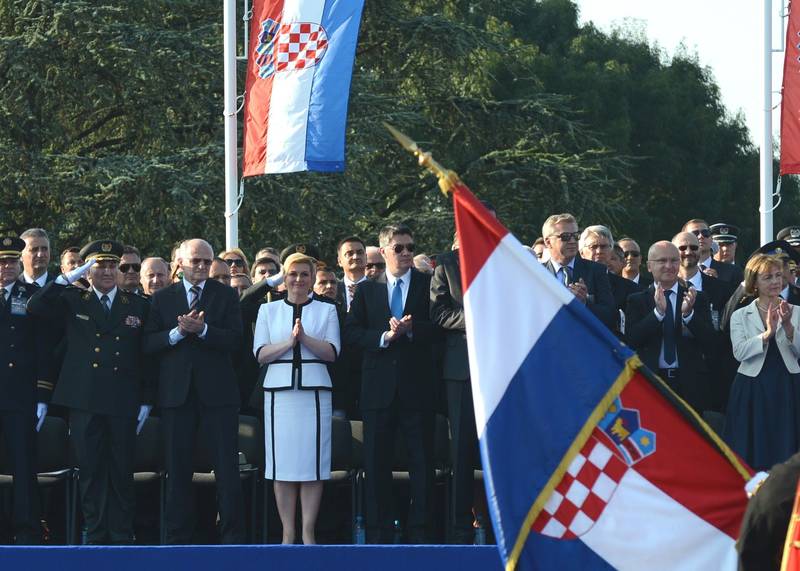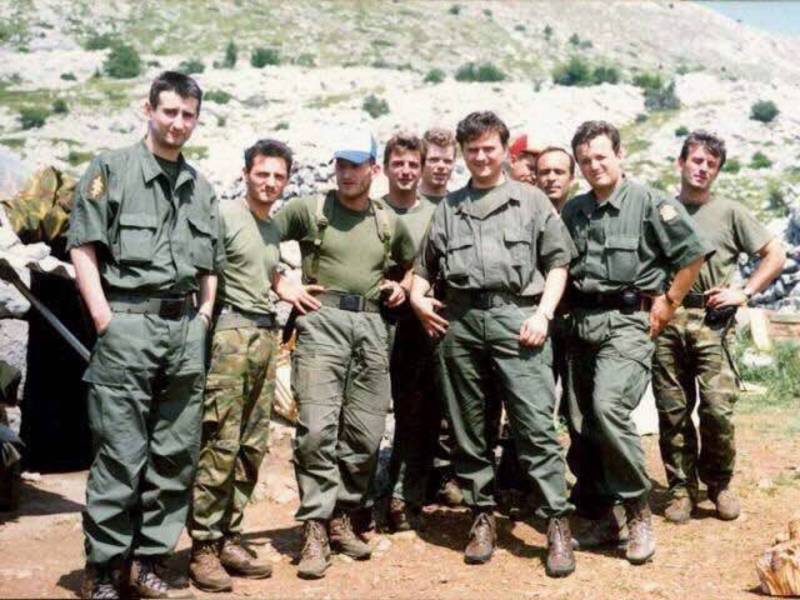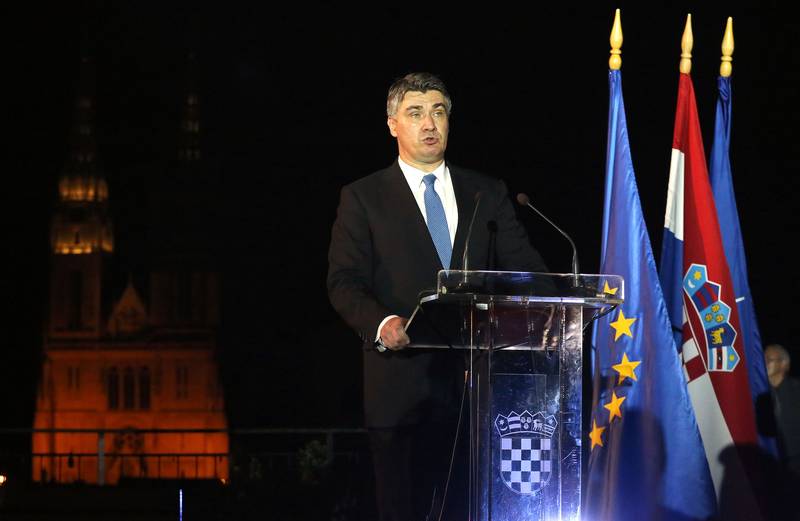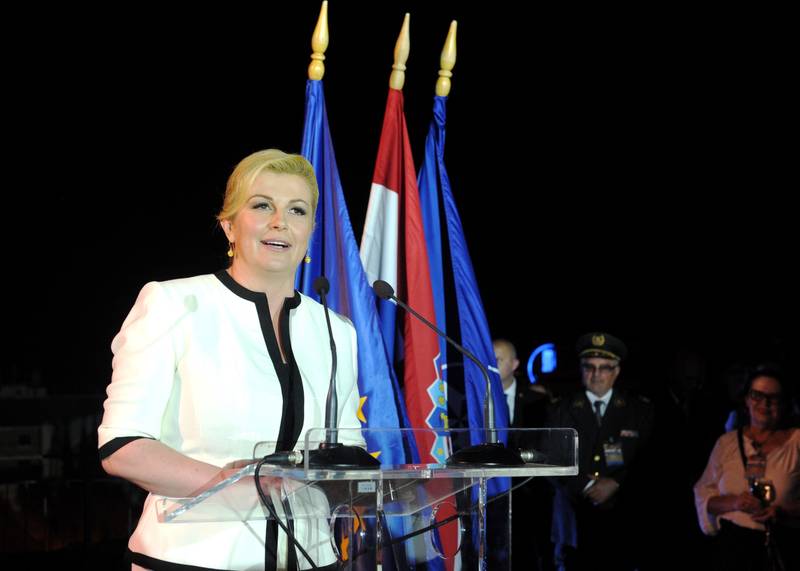20 Years Later the "Storm" Has Not Subsided
Adelina Marini, August 5, 2015
 The 20-year anniversary of operation “Storm”, with which Croatia restored its territorial integrity and ended its war for separation from former Yugoslavia, turned into an instrument for foreign and domestic political skirmishes. The Croatian armed forces’ military operation starts on August 4th aiming to reclaim Croatian territories, occupied by the Republic of Serbian Krajina. Croatia celebrates this day as a day of victory and thanksgiving to Croatian soldiers, although to this day the operation is considered controversial because of the many dead and displaced Serbs. It is something Croatian Prime Minister Zoran Milanović also admitted, saying it will continue to be perceived as controversial by many for years to come, including friends of Croatia.
The 20-year anniversary of operation “Storm”, with which Croatia restored its territorial integrity and ended its war for separation from former Yugoslavia, turned into an instrument for foreign and domestic political skirmishes. The Croatian armed forces’ military operation starts on August 4th aiming to reclaim Croatian territories, occupied by the Republic of Serbian Krajina. Croatia celebrates this day as a day of victory and thanksgiving to Croatian soldiers, although to this day the operation is considered controversial because of the many dead and displaced Serbs. It is something Croatian Prime Minister Zoran Milanović also admitted, saying it will continue to be perceived as controversial by many for years to come, including friends of Croatia.
Commemorating the anniversary Croatia decided to have a military parade less than a year after Serbia marked a different anniversary with a military parade, honouring the most distinguished guest – Russian President Vladimir Putin.
From domestic political dividends to foreign policy tensions
Parliamentary elections will be held in Croatia this year with the rally for them started as early as last year and the rivalry is fought along the axis of nationalism between the two major political parties – the Social Democratic Party (SDP) of PM Zoran Milanović and the Croatian Democratic Union (HDZ) of Tomislav Karamarko. Under Mr Karamarko’s leadership the HDZ did a sharp turn towards the far-right. This resulted in the second big victory for the party after last year’s EP elections – the presidential elections, won by the Union’s candidate Kolinda Grabar-Kitarovic. In an attempt to counteract the HDZ’s winning nationalistic policy and their significant lead in the polls Zoran Milanović’s Social Democrats decided to place their bets on the nationalist card as well.
In May of this year the committee that was formed especially for the commemoration of the 20-year anniversary and headed by Defence Minister Ante Kotromanović decided, that a military parade will be held in Zagreb on August 4th as a warm-up for the traditional celebration of Victory Day in Knin. Initially, Tomislav Karamarko was resilient towards this decision, thinking it will divert attention from Knin, but in a TV interview last night he stated that after an agreement was reached between the government and the President it  was important to him that this parade is “the best in the world”. A day before the parade he published on Facebook a photo of his participation in the operation (first left).
was important to him that this parade is “the best in the world”. A day before the parade he published on Facebook a photo of his participation in the operation (first left).
Apart from trying to steal votes from the HDZ, the decision to have a military parade in Zagreb had its foreign policy goals. The initial design of the organisers was to invite the friends and allies of Croatia to the parade, aiming to show that NATO and the EU stand behind the country and thus the operation will be fully internationally legitimised. Because of the severe geopolitical situation at the moment and the difficult government in Belgrade Croatia’s NATO allies declined participation with military equipment. The hardest blow came from neighbour Slovenia, which had committed to participate in the parade, but backed out under pressure and threats by Belgrade.
Serbia First Deputy Prime Minister and Minister of Foreign Affairs Ivica Dačić, former spokesman for Slobodan Milošević, announced that everyone participating in the commemoration of “Storm” will insult Serbia “because there is nothing to celebrate there”. Because of the decision to hold a military parade in Zagreb Mr Dačić cancelled his traditional participation in the annual Croatian regional “Croatia forum” held in Dubrovnik and dedicated this year to international humanitarian aid. For Serbia and Republika Srpska, which is part of Bosnia and Herzegovina, “Storm” is “the largest ethnic cleansing after World War Two on the territory of modern Europe”. This is the reason why Serbia and the second entity in Bosnia and Herzegovina named August 5th a national day of mourning.
According to Croatian large-circulation daily newspaper Jutarnji list columnist Jelena Lovrić, the refusal of foreign participation in the commemoration of “Storm” is no news. Ambassadors have never attended the celebrations in Knin, but this year the diplomatic corps attended the Zagreb parade. “The boycott of Knin is probably the result of the fact that the celebration there was initially intended to be a rightist feast”, wrote [in Croatian] Lovrić. The “celebration pump-up”, as she names the festivities in Knin, have never even marginally accepted the fact of the suffering of Serbs and the displacement of Serbian population. Objection to the lack of self-criticism was also voiced by Milorad Pupovac, leader of the Serb National Council (an organisation of the Serb minority in Croatia). In his words, it is horrific that in the organisation of the commemoration of the anniversary there was not a single mention of “the historic suffering of Croatian citizens of Serb nationality, as well as accepting moral and legal responsibility for the crimes, perpetrated during and after the operation.”
Tomislav Karamarko said in an interview that Mr Pupovac’s statement was not correct “toward his homeland”. And if before Prime Minister Zoran Milanović was moderate and even liberal towards Serbia and relationships in the Balkans, in the evening of August 4th he fully joined his political opponent’s discourse. In an interview for Croatian national television he stated that Croatia mourns all casualties and injured during the operation, regardless of whose side they were on, but reminded that the mass eviction of Serbs from Croatia was organised by Slobodan Milošević’s regime. The same was re-stated by President Kolinda Grabar-Kitarovic during her brief statement at last night’s reception. Later, in the attendance of the diplomatic and military corps, Mr Milanović finalised properly the ambition of his government to present operation “Storm” as a completely legitimate and liberation military operation.
He sent several quite clear messages to neighbouring Serbia. “Freedom is the greatest good and we do not have to prove to anybody after four heavy years of murders and deportations in the occupied territories that the “Storm” was reasonable, necessary, inevitable, and the number of new victims it prevented”. He reminded that Croatia was not celebrating the war nor somebody’s deportation, but rather its unification. With his speech he walked further into the HDZ’s voters sector by saying that victory was won by the people, “by our citizens, who elected the authority and entrusted it with ruling the country”. At that time, he continued, the most difficult since Croatia’s independence, the state was led by Franjo Tuđman. He is the one owed gratitude and recognition, said the Croatian PM.
Franjo Tuđman, the first president of independent Croatia is among the founders of the HDZ. Currently, under Tomislav Karamarko’s leadership, there exists a process of a personality cult formation towards the late leader. Now the Social Democrats have joined in the political canonisation of Mr Tuđman. In an attempt to win the sympathies of Tuđmanists there was even an idea to rename the Zagreb airport in his name, provoking sharp reactions from Serbia.
From election win to a loss of international and regional leverage
 Polls are showing that the public opinion responds to the behaviour change of Social Democrats, but it is still too early to say if this will bring them election victory. On the other side of the border, however, the effect of the 20-year anniversary celebration is much larger and shows the “storm” is far from subsided. During the specially organised rally in Sremska Rača Serbian Prime Minister Aleksandar Vučić stated that August 5th is the saddest day in Serbian history. “’Storm’ is a tragedy of Biblical proportions”, said Serbian Patriarch Irinej and Bosnian Serb President Milorad Dodik stated in an interview for the Serbian Blic that the Serbs are the biggest victims on the territory of former Yugoslavia.
Polls are showing that the public opinion responds to the behaviour change of Social Democrats, but it is still too early to say if this will bring them election victory. On the other side of the border, however, the effect of the 20-year anniversary celebration is much larger and shows the “storm” is far from subsided. During the specially organised rally in Sremska Rača Serbian Prime Minister Aleksandar Vučić stated that August 5th is the saddest day in Serbian history. “’Storm’ is a tragedy of Biblical proportions”, said Serbian Patriarch Irinej and Bosnian Serb President Milorad Dodik stated in an interview for the Serbian Blic that the Serbs are the biggest victims on the territory of former Yugoslavia.
In its commentary [in Serbian] Deutsche Welle reminded that like any other event during the bloody disintegration of former Yugoslavia “Storm” is also not with a clear conscience. The radio station quotes the editor-in-chief of Croatian weekly Novosti Ivica Đikić that Serbia lacks self-criticism and its leaders have no moral right to talk about “Storm”. “I mean that Serbia has to start talking at the highest level of its participation in the misery of Krajinian Serbs. The creation of Krajina and the military there was dictated and financed in the bluntest way by Belgrade”. Of a similar opinion is Dragan Popovic, the head of the Centre for Practical Policy. According to him, Serbia suppresses talks of its involvement in starting the war. Croatia was practically attacked and Belgrade’s responsibility is the largest. “Serbia has no grounds to feel morally superior to Croatia, as we ourselves have not made peace with our crimes”, adds the Serbian analyst.
Deutsche Welle, which is financed by the German government, comments that both sides must understand that they are responsible for the atmosphere they create in the public domain in the pursuit of adding political points. “Rather than creating an atmosphere of the past, they must, solving everyday questions that are important to the citizens of Serbia and Croatia, work towards creating an atmosphere that can give the possibility of a common future”, appealed in a declaration the Serbian Democratic Party.
During the statements from both sides of the border sneaked in barely noticeable admissions for committed sins, but in a different scale. In every speech in Croatia both by the ruling authorities and by opposition there was present a mention of victims on all sides, but no talk of committed crimes. The focus was on the operation being legitimate. Prime Minister Milanović admitted that big omissions were made during and after “Storm”, but reminded the eviction of the Serbs happened due to Milošević. In Serbian PM Aleksandar Vučić’s statement there is also a vague mentioning of the past. “Serbia has admitted the crimes that Serbs have committed and despised the ones committed against them”, said Mr Vučić. This ends the self-criticism. There was a major difference, however in the way of coverage of Croatian national television.
The comparisons between the military parade in Belgrade last October and the one in Zagreb on August 4th were somehow inevitable. In the middle of October 2014, Serbia marked the 70th anniversary of the liberation of Belgrade from the Nazis with an ostentatious military parade, the culmination of which was the visit of Russian President Vladimir Putin. At that time, the Serbian national television organised a special day-long studio, covering the parade itself as well as the visit of the Russian head of state. The coverage, as euinside wrote, was extremely one-sided and made following a model from the peak of the Cold War. Watching the live feeds and commentaries of hand-picked guests one is left with the firm conviction that Serbia is a victim. Not a word of the crimes committed by the following communist regime or later by the regime of Milošević.
The coverage of the military parade in Zagreb was incomparably more moderate. It did not last all day and did not have many guests. A military expert was invited who commented on the passing troops – where they were from and what equipment they ha. At the end of the live feed from the parade HRT made a review of the event, mentioning at the end by showing documentary footage that during operation “Storm” thousands of Serbs were displaced, hundreds of houses were torched  and crimes were committed. This is hardly enough to compensate the ever-sharper nationalist rhetoric in Croatia, but is indicative.
and crimes were committed. This is hardly enough to compensate the ever-sharper nationalist rhetoric in Croatia, but is indicative.
The consecutive episode of sharp contradictions between the two largest states from former Yugoslavia – Serbia and Croatia – shows that in fact very few problems have been solved. The silence of the international community in the name of the attempt the Serbian government is tamed, as part of the grand geopolitical puzzle, creates additional feeding medium for the dangerous Balkan nationalism. It is worth noting the ambiguous remark of Croatian Prime Minister Zoran Milanović during one of his interviews in the evening of August 4th that the Serbian-Croatian relationship depends on who is in power. Ambiguous, because such a comment could be aimed to the outside, or intended for domestic consumption.
If the price of the Serbian cooperation is the neglect of historic facts or their distortion, then the Balkans will remind again that they are still a powder keg. On Croatian Nova TV, HDZ leader Tomislav Karamarko stated that contemporary Serbian politics should not be based on myths and half-truths. This, however, applies fully to contemporary Croatian politics, especially the ones tempted by rightist ideology.
Translated by Stanimir Stoev
 Kolinda Grabar-Kitarovic | © KGK
Kolinda Grabar-Kitarovic | © KGK Jozo Rados | © European Parliament
Jozo Rados | © European Parliament Aleksandar Vucic, Andrej Plenkovic | © Vlada RH
Aleksandar Vucic, Andrej Plenkovic | © Vlada RH